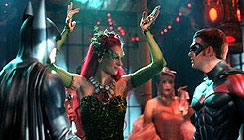|
|
|
|
Batman
& Robin
|
 |
|
Some events in popular culture attract a lot of attention and commentary not because they are full, rich and complex, but because they are absolutely the contrary: patchy, full of holes, chimerical, never making much sense for more than a few minutes at a time. Since 1989, the Batman films have achieved the height of pop patchiness. No new entry in the series really follows on from the last. After Michael Keaton and Val Kilmer, we are on to our third star to incarnate Batman, the fairly bland George Clooney. There have been two directors so far (Tim Burton and Joel Schumacher) but a substantially different style for each film – with the art direction concept, and the balance of action to comedy, changing radically every time. And with each outing we get a new set of villains, and a new girlfriend for Batman in his daytime identity (here this thankless role goes to Elle Macpherson). There are a number of new elements in Batman & Robin to prod our collective attention, once we have recovered from the usual daze induced by the monumental sets, the blurry fight scenes, and the dizzy array of bad guys and gals with their extravagant, sometimes barely comprehensible schemes of world domination. The best of these additions are the women: the sneaky, feisty Batgirl (Alicia Silverstone) makes a late-breaking appearance among the goodies; and among the baddies, Uma Thurman is a histrionic delight as Poison Ivy, a monstrous Mother Nature born in a mulch of toxic chemicals. Gone, in this latest outing, is the pretension to Big Themes such as Batman's troubled neuroses, or the ambitious aesthetic of "modern medievalism'" elaborated in Burton's Batman Returns (1992), for me still the best film of the series. Gone, too, is any debt to the style or content of today's graphic novels such as Frank Miller's The Dark Knight Returns, which largely provided the inspiration for Burton's initial foray into this field. No, Batman & Robin is the most purely, simply cartoonish film in the series to date. A tiny bit of spice is added by words like "family" and "trust" being bandied about by the characters, and by Robin's act of teenage rebellion once he has come under the spell of Ivy. But everything is functional, mechanical and down-the-line here, with little fun, pizzazz or perversity – an impersonality embodied in Arnold Schwarzenegger's performance as Mr Freeze, restricted to the utterance of 100 lame one-liner puns about ice, coldness and freezing. As superheroes go, Batman & Co. are oddly ineffectual, earthbound figures – a problem that no film in this blockbuster series has yet managed to overcome. They lack super powers, are not much chop in hand-to-hand combat, and their handiest, most powerful technological gadget is the thingy that regularly hooks onto a nearby surface to stop them plunging to certain doom. The Batman television series of the '60s made a running joke of the fact that these heroes spent most of their time getting knocked out, tied up and left to die – but always coming up with a cornily brilliant escape plan at the next-to-last second. On the big screen, however, we expect more assertive, action-packed heroism. Lacking a good, bold narrative idea that might provide such a kick, Schumacher again beefs up everything and everyone around our middling do-gooders – sets, explosions, chases, noises, expendable side-bar characters. But such a band-aid approach leaves the series to limp along with its central problem unresolved: finding a central core of interest and intrigue that might cohere the wild flurry of diverse elements that are churned up in each new instalment. MORE Schumacher: Batman Forever, D. C. Cab, Phone Booth, The Phantom of the Opera MORE Batman: Batman Begins MORE superheroes: Elektra, Daredevil, Catwoman, Hellboy, Spider-Man, Spider-Man 2 © Adrian Martin June 1997 |
![]()